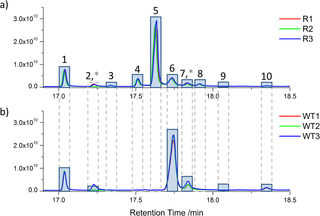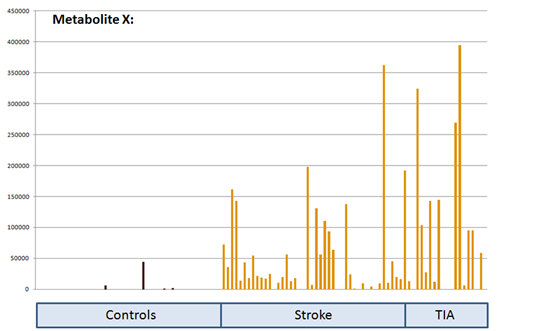

Glasgow Polyomics has catalysed the wide spread use of all of the omics based research strands into biomedical and biological sciences across the University of Glasgow and beyond. Advances in our ability to collect huge datasets relating to all of the fundamental biochemical components of life is revolutionising how the biomedical sciences impact on all that we do. Below are a few examples of where our impact is being made.
We have completed over 1000 projects and we have a proven track record of innovation that allows us to deliver world-class research to academic institutions and industry on a range of diverse organisms, samples and projects. At Glasgow Polyomics our expertise has been utilised in clinical projects, industrial biotechnology, drug discovery and biomarker identification, ancient DNA from preserved samples. We have even analysed meteorites!
Glasgow Polyomics was featured in the BBC documentary with Dr Michael Mosley The Wonderful World of Blood in which samples of blood were analysed by mass spectrometry after eating different types of food.
Drug ResistanceClinicalArtsMethodsBiomarker
Drug Resistance and Mode of Action
Amphotericin B has emerged as the therapy of choice for use against leishmaniasis, a parasitic disease found in tropical regions. Glasgow Polyomics carried out liquid chromatography mass spectrometry and genome sequencing were used to understand the mechanisms of drug resistance by comparing wild type (WT) and lab-derived drug resistant lines. Changes in metabolites putatively identified the sterol metabolic pathway later confirmed through a targeted approach.

The biggest difference was observed in ergosterol. Whole genome sequencing was carried out from wild type and resistant cell lines, specifically looking for genetic alteration in genes relating to the sterol metabolic pathway. A non-synonymous mutation was found in the gene encoding 14-demethylase.
Example Publications
Pountain et al. Genomic instability at the locus of sterol C24-methyltransferase promotes amphotericin B resistance in Leishmania parasites. DOI: 10.1371/journal.pntd.0007052
Mwenechanya et al. Sterol 14alpha-demethylase mutation leads to amphotericin B resistance in Leishmania mexicana. DOI: 10.1371/journal.pntd.0005649
Clinical Studies
Glasgow Polyomics carried out a small scale study looking at changes in metabolites over time in an effort to reduce variability and produce meaningful data. For this proof-of-concept study, we worked with 7 trained cyclists, taking samples every 15 minutes. A comparison of two analysis methods was then used.

Linear models were used to plot the changes in metabolites across the time-course and clear changes in metabolism identified across time, including the discovery of novel metabolites associated with post-fatigue recovery.
Example Publications
Blackburn et al. Running on empty: a metabolomics approach to investigating changing energy metabolism during fasted exercise and rest. DOI: 10.3390/metabo10100399
Rodgers et al. The rheumatoid synovial environment alters fatty acid metabolism in human monocytes and enhances CCL20 secretion. DOI: 10.1093/rheumatology/kez378
Arts and Humanities
Glasgow Polyomics is experienced in analysing historic samples or museum artefacts. For example, we sequenced DNA from historic lung samples in Hunter’s collection at the University of Glasgow which might have included tuberculosis bacteria. Investigations into the evolution of the Tuberculosis genome over several hundred years can help our understanding of Tuberculosis' re-emergence as a public health problem.

Mass spectrometry-based to analyse the composition of ink and paper used on contested works of Robert Burns and used to distinguish forged Burns documents. We have also worked with Computing Scientists to apply word-window machine-learning based clustering methods to a number of poems. A truly interdisciplinary project!
Publication
Newton et al. Minimally-destructive atmospheric ionisation mass spectrometry authenticates authorship of historical manuscripts. DOI: 10.1038/s41598-018-28810-2
Methods and Platform Development
At Glasgow Poyomics we work on a range of informatics and technical methods development projects in conjuction with researchers.
Example Publications
Nui et al. R package for statistical inference in dynamical systems using kernel based gradient matching: KGode. DOI: 10.1007/s00180-020-01014-x
Wandy et al. Ms2lda.org: web-based topic modelling for substructure discovery in mass spectrometry. DOI: 10.1093/bioinformatics/btx582
Gloaguen et al. PiMP my metabolome: An integrated, web-based tool for LC-MS metabolomics data. DOI: 10.1093/bioinformatics/btx499
Recknagel et al. Double-digest RAD sequencing using Ion Proton semiconductor platform (ddRADseq-ion) with nonmodel organisms. DOI: 10.1111/1755-0998.12406
LC-MS approach for Biomarker Discovery in Stroke
Glasgow Polyomics collaborated with Prof Jesse Dawson helped identify biomarkers in patients with suspected stroke and transient ischaemic attack (TIA). These results enhanced the understanding of stroke pathophysiology and distinguish from TIAs from other diagnoses. An initial study showed that there was little of significance found in serum, however clear differences were noted in urine. This was transferred to a large clinical cohort of over urine 500 samples. From this a variety of markers were identified that could contribute to statistical models predictive of stroke. Of huge significance was the identification of a metabolite (X) that was found almost exclusively in patients but not controls.

These studies have included the clinical environment in which the test will be used (using mimics as controls), and we have identified the clinical scenario in which biomarker levels differ most between cases and mimic. Its levels remain elevated for a prolonged window (1 week at least) leaving room for optimizing the window of its detection. The metabolite is not consistent with any metabolite in the human metabolome database, demonstrating the advantage of taking an untargeted metabolomics approach.
Example Publications
Daly et al. Changes in Plasma Itaconate Elevation in Early Rheumatoid Arthritis Patients Elucidates Disease Activity Associated Macrophage Activation. DOI: 10.3390/metabo10060241
Pesko et al. Post-mortomics: the potential of untargeted metabolomics to highlight markers for time since death. DOI: 10.1089/omi.2020.0084
Industry 1Industry 2Industry 3
CalaChem is a Scottish company based in Grangemouth specialising in contract manufacturing in agrochemical, pharmaceutical and chemical industries. One area of interest is the treatment of aqueous waste and the microbiological and biochemical environment in waste treatment tanks. Glasgow Polyomics analysed the bacterial diversity in the treatment tanks over time as well as the biochemistry of the waste. We were able to identify ways in which process efficiency may be improved, potentially providing significant value to the company.
CelluComp has developed a unique nano-cellulose-based fibre for use a wide variety of applications. A long-term partnership between CelluComp and Glasgow Polyomics has seen successful applications for a FoodWasteNet Business Interaction Voucher (BIV) and FoodWasteNet Proof of Concept (PoC) grant to valorise CelluComp’s secondary products.
Using the PoC funding, Glasgow Polyomics provided a biochemical analysis of CelluComp’s by-product streams. This was able to support CelluComp’s commercial goals, while providing valuable biochemical information about their waste streams.
Celtic Renewables produce biobased butanol, acetone, ethanol and high-grade animal feed using the residues (draff and pot ale) from the whisky industry. Glasgow Polyomics and Celtic Renewables were awarded an Impact Accelerator grant in 2017 from IBioIC to analyse the biochemistry of solvent production using metabolomics with the aim of improving fermentation success.
Several sample sets have already been analysed at Glasgow Polyomics’s state of the art facilities and the information garnered has been valuable to informing Celtic Renewables’s processes.